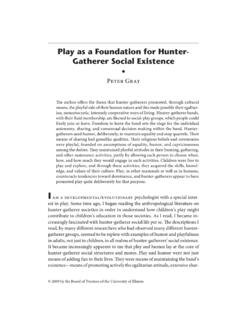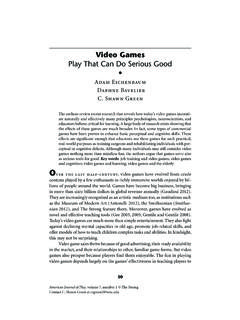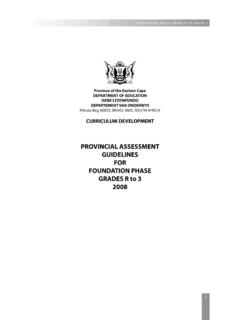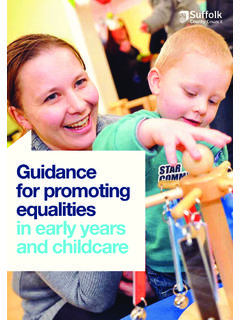Transcription of Playwork, Play Deprivation, and Play: An Interview with ...
1 267 playwork , play deprivation , and PlayAn Interview with Fraser BrownFraser Brown, Professor in playwork and Lecturer at Leeds Metropolitan University in the United Kingdom, has become best known in North America over the last decade for helping expose the plight of abandoned and abused Romanian orphans. Brown advocates for environmental design strategies that enrich children s play environments, and he is the author, editor, or coauthor of a number of works, including two that are forthcoming: playwork : Theory and Practice; Foundations of playwork ; The Venture: A Case Study of an Adventure Playground; Rethinking Children s play and play and playwork : Reflections on Practice.
2 In the Interview that follows, Brown discusses the development of playwork as a discipline, a child s inherent right to play (and the consequences of denying that right), the chal-lenges of the noninterventionist approach, and the inventive, exuberant games he observed among Roma children in small villages in Transylvania. Key words: play among Roma children; play deprivation ; playwork ; Romanian orphansAmerican Journal of play : Dr. Brown, what is playwork ? Fraser Brown: The essence of playwork is this: Children learn and develop while they play . The benefits of play are both immediate and for the future. In many modern Western societies, children are no longer free to play in the way that their parents generation used to.
3 This is potentially dangerous both for the individual child and for society in general. The role of the playworker is to create the conditions that make it possible for children to play freely. AJP: How did you become interested in playwork ? Brown: During my final student vacation from college, I was sitting in a park in a seriously disadvantaged area of London watching some people in track suits trying to engage a small group of children in some informal games. The children clearly were not interested. I started chatting to a friend about how badly organized it all was, and then we rather arrogantly discussed how we could do much better.
4 Within a week we were running our own play scheme in the same park with more than two hundred children and a lot American Journal of play , volume 4, number 3. The Strong Contact Fraser Brown at 268 AMERICAN JOURNAL OF PLAYsWINTER 2012of scrounged materials, including giant puppets, cardboard boxes, and an enormous inflatable cube. I remember that on the first afternoon I became completely convinced this was something worth doing with my life. When I left college, I applied for the first suitable job I saw advertised namely for an adventure-playground worker in Runcorn, near Liverpool. I was fortu-nate enough to get the appointment.
5 That was back in the 1970s when the UK government was spending a lot of money on supervised play : How did playwork grow as a discipline? Who influenced it chiefly?Brown: The early days of playwork , in the 1950s and 1960s, were characterized by playwork evangelists like Drummond Abernethy, the great proponent of adventure playgrounds, and Lady Allen of Hurtwood, who started the first adventure playground for disabled children. They were greatly influenced by the Danish architect Carl Theodor Sorensen, who had written about junk playgrounds where children could imagine, shape, and create their own reality. In the 1970s, people such as Joe Benjamin and Bob Hughes provided the germ of ideas that playworkers now take for granted they thought children should be in control of their own play places and the value of enriched play environments.
6 In the 1980s, Hughes along with Hank Williams made the first attempt to develop some solid theoretical grounding for playwork practice. That period also saw playwork trainers and managers making widespread use of SPICE social interaction, physical activity, intellectual stimulation, creative achievement, and emotional stability although they usually mis-represented the original concept. Since then, a number of writers have advanced playwork theory, but most tend to focus on biological, psycho-logical, and evolutionary models of play and playwork to the detriment of sociological and developmental models. AJP: What is the nonintervention directive of playwork ?
7 Brown: Nonintervention is a fundamental playwork idea that the playworker s role is to provide the sort of free play opportunities that have been taken away by an increasingly overprotective and suspicious society. Therefore, playworkers avoid interfering too readily in situations that might be per-ceived by some to be : How do a playworkers resist the urge to meddle?Brown: Playworkers have to develop an approach of dynamic risk assessment one that constantly assesses the level of risk against a child s natural incli-nation to explore and experiment. In that sense, safety and security are playwork , play deprivation , and play 269not incompatible with free play .
8 Once you have spent time with children sitting round a campfire, you realize that most of them are just as aware of the dangers as you. Of course, this approach carries its own risks but, in the words of Lady Allen of Hurtwood: Better a broken arm than a broken spirit. AJP: Is it possible to separate enabling and empowering children from supervis-ing or leading them? Brown: Enabling and empowering are concepts that sit at the very heart of play -work. In the 1970s when I started in this field, we were called playleaders. At almost every meeting I attended in those days, someone complained about that label because they did not see themselves as people who took the lead, but rather more as people who followed the lead given by the children.
9 We started calling ourselves playworkers because we wanted to retain the reference to play but at the same time emphasize the professional nature of the work. There are obviously elements of supervision in playwork because play -workers are under a legal obligation to make sure children do not hurt themselves. However, we rarely carry out that role in the didactic way that a teacher might. There is no sense of the playworker as legal arbiter or moral adviser. Playworkers feel obliged to split up a fight, but they do not see it as their role to lecture children about the rights and wrongs of : Does this help explain why playwork has not caught on in the United States the way it has in Great Britain?
10 Brown: That s not for me to say. It is already the case that insurance claims have had an impact on playwork practice in the UK, and I have the impression that the United States is a far more litigious society than the UK. Ironi-cally, when insurance companies actually defend cases in the UK, they tend to win. The problem is that it is easier and cheaper to settle out of court, with the result that we see newspaper reports of parents being awarded thousands of pounds for their child s broken arm. That in turn encourages more parents to make a claim. It might well be that the situation would be even more extreme in the United : Are there dangers in this current trend toward risk aversion?






